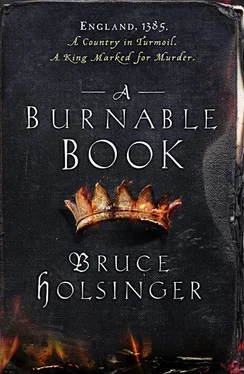Bruce Holsinger - A Burnable Book
Здесь есть возможность читать онлайн «Bruce Holsinger - A Burnable Book» — ознакомительный отрывок электронной книги совершенно бесплатно, а после прочтения отрывка купить полную версию. В некоторых случаях можно слушать аудио, скачать через торрент в формате fb2 и присутствует краткое содержание. Год выпуска: 2013, Издательство: HarperCollins Publishers, Жанр: Исторический детектив, на английском языке. Описание произведения, (предисловие) а так же отзывы посетителей доступны на портале библиотеки ЛибКат.
- Название:A Burnable Book
- Автор:
- Издательство:HarperCollins Publishers
- Жанр:
- Год:2013
- ISBN:нет данных
- Рейтинг книги:4 / 5. Голосов: 1
-
Избранное:Добавить в избранное
- Отзывы:
-
Ваша оценка:
- 80
- 1
- 2
- 3
- 4
- 5
A Burnable Book: краткое содержание, описание и аннотация
Предлагаем к чтению аннотацию, описание, краткое содержание или предисловие (зависит от того, что написал сам автор книги «A Burnable Book»). Если вы не нашли необходимую информацию о книге — напишите в комментариях, мы постараемся отыскать её.
A Burnable Book — читать онлайн ознакомительный отрывок
Ниже представлен текст книги, разбитый по страницам. Система сохранения места последней прочитанной страницы, позволяет с удобством читать онлайн бесплатно книгу «A Burnable Book», без необходимости каждый раз заново искать на чём Вы остановились. Поставьте закладку, и сможете в любой момент перейти на страницу, на которой закончили чтение.
Интервал:
Закладка:
And who had written Seguina’s peculiar couplet in the book? Perhaps Seguina herself, as she fled with the book from La Neyte, though it was hard to imagine her pausing to scribble a riddle in a manuscript while being pursued from Westminster and into the Moorfields. The lines did not appear in Clanvowe’s copy, yet they carried a threat all the more ominous for their very uniqueness. Making a decision, I packed the two volumes in my bag and left the house.
Westminster. In the great hall Sir Michael de la Pole was holding forth inside the priest’s porch. When he saw me he gave a subtle nod, finished his business, then ushered me into his chambers. I spoke with the Lord Chancellor for over an hour, revealing nearly all I knew, even Simon’s authorship of the thirteenth prophecy, though somehow he had already been made aware of that unpleasant fact. I showed him both books as well, making sure he understood the full implications of what I was telling him.
‘You’re saying there is to be a second attack on the king, then,’ said the chancellor, sounding sceptical.
‘Yes, my lord.’ I repeated Sir Stephen Weldon’s final words at the Pricking Bishop. ‘“Hawks always strike twice,” he said. “Always twice.” We all saw the first attack at Winchester’s palace, how that turned out. And now the king’s guard is down. I believe Seguina’s lines are telling us the second attack is to come on Trinity Sunday.’ I paused. ‘Tomorrow, my lord.’
The chancellor still looked unconvinced. ‘How can we know for certain that-’
‘The thirteenth prophecy, the butchers, all of that — it was smoke,’ I said, the words tumbling out of my mouth. ‘Hawkwood’s ruse, meant to turn suspicion on Lancaster, have him eliminated. And it nearly worked. But Lancaster was just the glaze on the bun. The real target is the king.’
‘And you’re basing all of this on this girl’s two lines of doggerel? This chicken-scratch in your manuscript?’
‘Not my manuscript, Lord Chancellor. This is the book from which Lord Oxford himself read on Dunstan’s Day. The book we have all been tracking down for months.’
He gave me a strange look. ‘Are you quite sure, Gower?’
‘My lord?’
‘You’re quite sure this is the book we’ve all been looking for?’
He could see the confusion on my face. With a studied calm, the baron stood, walked to a book chest against the wall of his chamber, and fussed with the lock. He removed a small volume, no thicker than a short quire and covered in a skin of plain and weathered black. It looked familiar.
Back at his desk he opened it and spun it around. I recognized the hand immediately as Chaucer’s. The quire was a messy jumble, the margins covered in notes and drawings: tables, columns of figures, sketches, maps. I had struggled with Chaucer’s shorthand before, and though I could make out little of his notation, I saw immediately that half of the quire was taken up with the De Mortibus . There was only one difference between this copy and the two on the chancellor’s desk, I saw as I paged through to the end — a rather major difference.
The thirteenth prophecy was missing. Chaucer, then, had told me the truth. He had not written the prophecy of Richard’s death.
‘Three books,’ I said, looking up.
‘The one in your hands now is the original,’ he said. ‘Chaucer’s draft, written in Florence, and covered with his notes and observations. Then came this one.’ He tapped Oxford’s copy, the book in my son’s hand. ‘Simon, when he wrote it, added the thirteenth prophecy.’
‘Which Sir John copied along with the rest,’ I said, indicating Clanvowe’s manuscript.
‘Though before your mysterious couplet was added. Otherwise Clanvowe would surely have copied that as well.’
I nodded absently. ‘But how did you get Chaucer’s original, my lord? Who gave it to you?’
A long pause. ‘Your son.’
Of course . I thought of Simon waking me that night at Overey, the hole in my house’s wall. It made a strange kind of sense, though the chancellor’s subsequent account would leave me cold.
‘As you know, Gower, King Richard made Sir John Hawkwood his ambassador to Rome just after the Rising,’ he began. ‘Not the most courtly envoy in the world, but Italy is a privy. We needed a strong presence there, a man flexible in his alliances. Hawkwood fit the bill like no one else. And he’s one of us. An Englishman, yet with no ambition in his homeland.’
He settled his hands on his stomach. ‘Or so we thought. As we discovered about three years ago, Hawkwood has been buying up land and properties near his family seat. Nothing too substantial. Perhaps his wife was pregnant, and he was thinking about his legacy, was our thought. It happens. But then he started purchasing properties in other places. London, for one — a house here, a block of tenements there — as well as Essex. Gosfield, Sible Hedingham. It became clear that Hawkwood didn’t want to simply retire. He wanted to come back here as a powerful man. Not just titled but garrisoned, it seemed. We tried to keep an eye on him from afar, but he was growing increasingly erratic. Envoys and letters were not enough.’
‘You needed a spy,’ I said.
‘We wanted a man in Hawkwood’s chancery, someone gifted with ciphers and scripts, who could tell us from abroad what he was up to, and get us the information we needed in a form we could trust. A forger, a cryptographer, a natural spy. We chose Simon.’
I frowned. ‘You chose him? And how soon after his arrival in Florence was this?’
The baron looked chagrined. ‘You don’t understand, Gower. We sent him to Florence.’
‘You sent him?’ It hit me. ‘What about the counterfeiting, the death of that man on the wharfage? Simon killed him. Chaucer cleaned it all up. That’s why Simon went into Hawkwood’s service in the first place.’
He gave a modest shrug. ‘A charade, every bit of it. My man More set it up. The ward constable who was killed — and not by Simon, if that’s any comfort — was an informant working for the French, lured to the wool wharf with the promise of an exchange. The watchmen were ours, paid from the royal treasury. It was a simple matter to get them swearing up and down they had watched a struggle and an accidental death at Simon’s hands.’
‘But Chaucer-’
‘Chaucer had to be convinced it was all legitimate. That Simon had to leave London, and quickly, with the taint of scandal following him.’
I gaped at him.
‘You have to see it our way,’ he said, leaning forward. ‘Chaucer and Hawkwood go back twenty, twenty-five years, since before Geoffrey was taken prisoner at Retters. It was Hawkwood who negotiated Chaucer’s release on behalf of King Edward, you know, along with the others. After that they were together in Spain, France, Italy — getting up to God knows what. You’ve heard the stories.’
I admitted I had. Most of them I didn’t believe, though the few that seemed credible could curdle milk. ‘So you exploited Chaucer’s long friendship with the man to get Simon placed down there,’ I said. ‘Then why did you send Chaucer back last year? Wasn’t that something of a risk, given the circumstances?’
He grimaced. ‘We needed to get a message to Simon, but couldn’t risk having Hawkwood capture one of our messengers. So we sent Chaucer down there at the head of a diplomatic company, ostensibly to see about the wool.’
‘Wool?’
‘Nothing more complicated than that — nor more crucial to His Highness’s treasury.’
‘Wool, the goddess of the merchants,’ I murmured, recalling one of my own French lines.
‘Our greatest export,’ said the chancellor, ‘and the Genoese the only foreign shippers allowed to bypass Calais. Thousands of sacks a year from Southampton to Italy. Tens, maybe hundreds of thousands of pounds. We’re always stepping in to sniff around for smuggling and evasion. Chaucer has been controller of the wool custom for some time, and he was only too happy to make a discreet trip south for a few months, get him away from Philippa. “We need some feathers smoothed,” he was told.’
Читать дальшеИнтервал:
Закладка:
Похожие книги на «A Burnable Book»
Представляем Вашему вниманию похожие книги на «A Burnable Book» списком для выбора. Мы отобрали схожую по названию и смыслу литературу в надежде предоставить читателям больше вариантов отыскать новые, интересные, ещё непрочитанные произведения.
Обсуждение, отзывы о книге «A Burnable Book» и просто собственные мнения читателей. Оставьте ваши комментарии, напишите, что Вы думаете о произведении, его смысле или главных героях. Укажите что конкретно понравилось, а что нет, и почему Вы так считаете.












